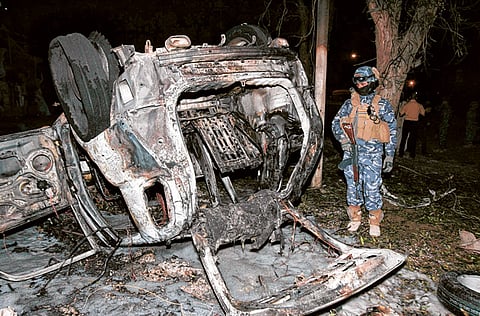US official spots chinks in Iraq strategy
Says some troops must stay back to avert a security collapse and its regional ramifications

Baghdad: A senior US military official said on Wednesday that keeping some US forces in the country would be "best for Iraq" and warned that the Iraqi military was not equipped to ward off threats in an increasingly volatile region.
The remarks, made on condition of anonymity due to the political sensitivity of the issue, indicate a growing concern among American officials that the Iraqi government is closing the door on a new agreement for US troops in Iraq past the end of this year.
The comments to a small group of reporters also signalled a concern that a militarily weak Iraq could be another destabilising factor in what has become a volatile region.
The remarks, the most pointed yet by a senior military official after months of silence, follow renewed warnings by firebrand cleric Muqtada Al Sadr that he would reactivate his Mahdi Army militia if US forces or even a significant embassy presence remains.
Uncertain outlook
"This is a very interesting and dynamic region right now and it's very difficult to predict what's going to happen, so I think having the ability to defend yourself is fundamental in terms of maintaining your sovereignty," the official told reporters at the US military headquarters at Camp Victory near Baghdad.
"When we do leave Iraq, it will probably have less capability in terms of military hardware than any of its neighbours," he said, adding that even Kuwait next door probably has more tanks.
While Iraq has made an initial purchase of US tanks and artillery, some of that equipment will be arriving when US forces leave, with no opportunity to ensure that the Iraqi military becomes proficient in using it, another official said.
The senior official also raised the possibility that without US help, Iraqi security forces could have trouble containing Al Qaida-linked groups.
"The Iraqis have to have that capability to address that issue because if they don't we can expect they will continue to grow in capability so there is a terrorist threat that's still there," the official said. US forces currently provide intelligence, surveillance, and forensic assistance to Iraqi counter-terrorism forces.
Losing the advantage
In addition to the lack of capacity to defend its land borders, the official said the US military remains concerned that significant strides made by Iraqi security forces in the past several years could be set back if US training and assistance stopped.
"We also think the security of this country is pretty important because the country is important to the region and the region is important to us. This is what's best for Iraq and the Iraqi leadership once again has got to make a decision about what they think is best, but we would hope that they would make an informed decision,'' the official said.
The remaining 47,000 US forces are expected to begin next month an almost irreversible withdrawal from Iraq.
A complete withdrawal would leave fewer than 117 uniformed personnel in the embassy's security cooperation office plus a contingent of about 150 marines who currently help to protect the embassy. If there is no new status of forces agreement, the US could still negotiate bilateral pacts for specific training and assistance missions.



